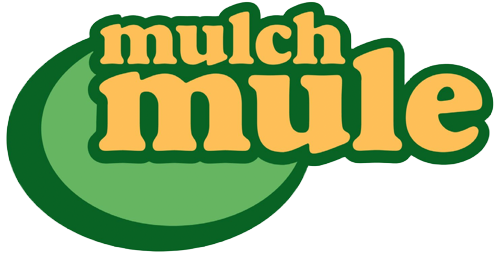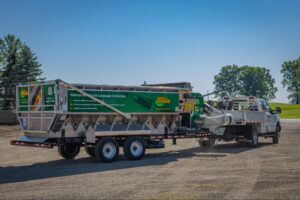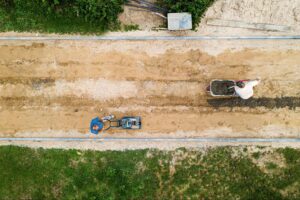Quality control is the cornerstone of excellence in commercial landscape maintenance. It sets high standards for outdoor spaces, ensuring they are visually appealing, safe, and functional. Effective quality control leads to consistent results, enhanced client trust, and improved operational efficiency. Advanced equipment enables businesses to streamline operations, improve safety, and maintain high standards while reducing costs.
Importance of Quality Control in Commercial Landscaping
Quality control is critical for delivering exceptional results in commercial landscaping. It guarantees consistency, reliability, and precision across various projects—from corporate campuses to retail centers—while enhancing a company’s reputation and competitive advantage.
Ensuring Consistency
Maintaining uniformity across projects reinforces professionalism. Regular quality inspections and clear, standardized procedures help ensure every site, whether an office park or a residential community, looks impeccably maintained. This consistency preserves the value of properties and strengthens long-term client relationships.
Gaining a Competitive Edge
Rigorous quality control demonstrates a commitment to excellence that attracts new clients and secures repeat business. High-quality, well-kept landscapes reflect positively on both property managers and landscaping providers, differentiating businesses in a competitive market.
The Key Pillars of Quality Control
Achieving excellence in commercial landscaping revolves around several core principles: aesthetic excellence, safety, resource optimization, and client satisfaction.
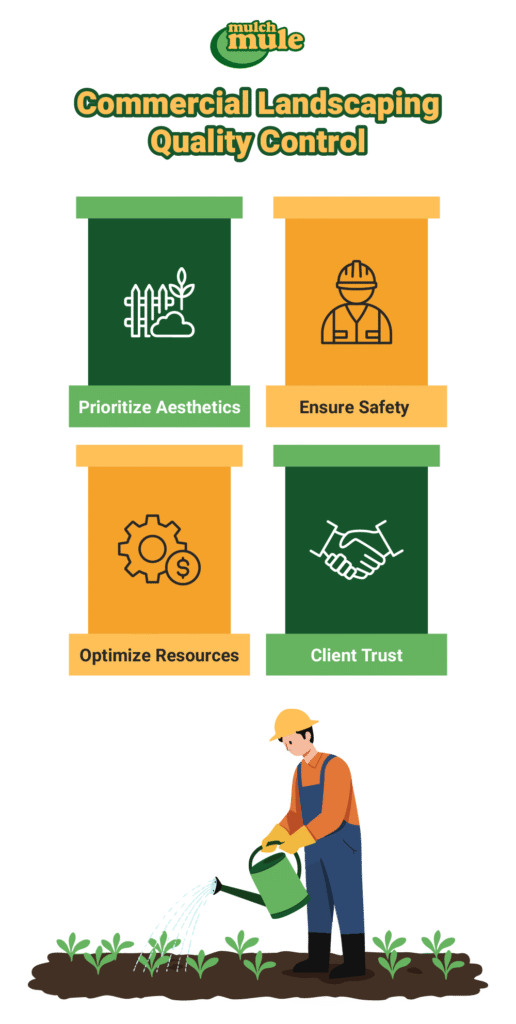
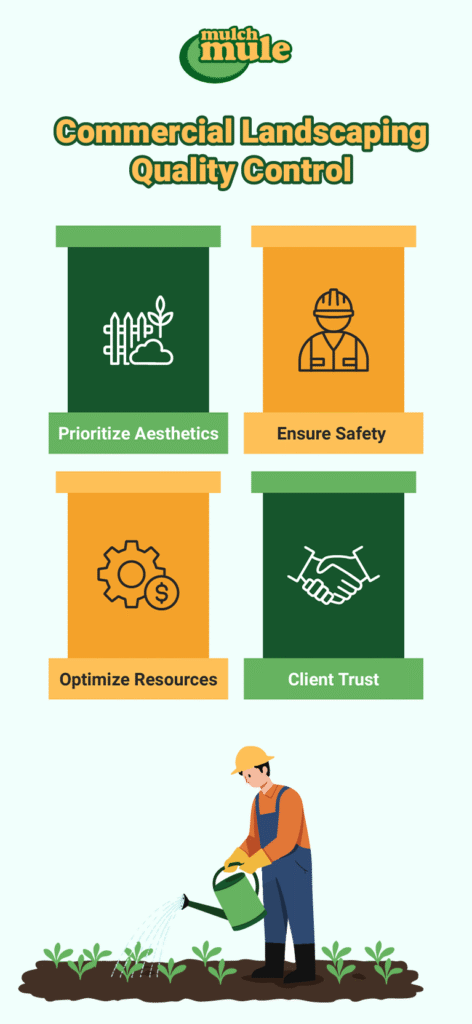
Aesthetic Excellence
Well-maintained landscapes create a strong first impression. Regular mowing, fertilization, weed control, and seasonal plantings ensure that properties remain visually appealing. Proactive care, such as early detection of pest issues or plant diseases, prevents small problems from escalating.
Safety as a Priority
Routine inspections and maintenance are vital to prevent hazards like loose debris and uneven surfaces. By focusing on safety—through proper equipment handling, clear walkways, and regular employee training—landscaping teams reduce risks for both workers and visitors.
Resource Optimization
Effective resource management minimizes waste and maximizes returns. Accurate material estimates, efficient scheduling, and regular equipment maintenance enable landscaping teams to complete jobs faster and more cost-effectively without compromising quality.
Building Client Satisfaction and Trust
Consistent quality leads to strong client relationships. Regular communication, scheduled site inspections, and prompt problem resolution reinforce trust, ensuring clients remain confident in the landscaper’s ability to deliver superior results.
Enhancing Landscaping Quality Control with Equipment and Technology
Modern equipment plays a key role in achieving quality control. Advanced tools reduce labor-intensive tasks, improve precision, and eliminate guesswork, allowing for consistent and high-quality service delivery.
Boosting Efficiency with Advanced Tools
Innovative equipment, such as automated mowers, can significantly reduce the time required for routine tasks. These tools are designed to streamline repetitive processes, allowing work to move quickly and accurately.
Specialized Equipment for Consistent Quality
Certain specialized equipment similar to the Mulch Mule is engineered to enhance efficiency and safety in landscaping projects. Many units incorporate features like high-capacity hoppers and advanced control technologies that facilitate rapid and uniform distribution of materials. They may also include material-discharge systems that reduce manual labor and promote efficiency.
Adapting to Diverse Project Needs
Versatile machinery that operates effectively across different seasons and project types ensures that landscaping teams can adjust to varying needs. Whether distributing mulch in the spring or clearing leaves in fall, adaptable equipment supports consistent outcomes and minimizes downtime by reducing the frequency of manual intervention.
Benefits of Robust Quality Control Practices
Implementing strong quality control practices offers multiple benefits for commercial landscaping businesses.
Strengthening Business Reputation
Consistently well-maintained landscapes enhance client satisfaction and drive referrals. A reputation for excellence not only positions a business as an industry leader but also opens the door for repeat contracts and long-term partnerships.
Maximizing Cost Savings and Profitability
Efficient processes reduce material waste and labor costs. By streamlining workflows and employing high-performance tools—including those with features like high-capacity hoppers—companies complete projects more quickly and avoid rework, ultimately boosting profitability.
Enhancing Safety and Employee Satisfaction
A structured quality control program prioritizes employee safety and provides clear operational guidelines. Reduced manual labor, along with regular equipment maintenance, lowers the risk of workplace injuries and contributes to higher employee retention.
Building Long-Term Client Trust
Transparent communication and regular inspections reassure clients and build lasting relationships. By addressing issues promptly and maintaining high standards on every project, landscaping providers earn stronger client loyalty and trust.
Mulch Mule’s Role in Quality Control
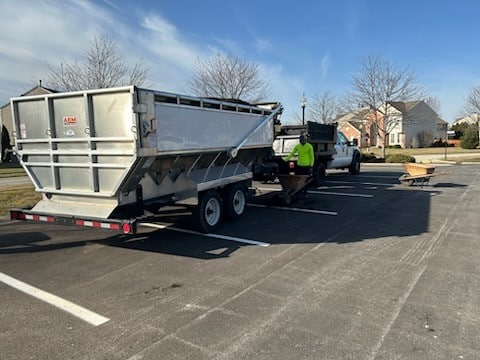
Equipment that shares characteristics with the Mulch Mule supports quality control efforts by streamlining workflows, enhancing safety, and offering versatility in various projects.
Driving Efficiency and Reducing Costs
Models akin to the Mulch Mule are designed to automate labor-intensive tasks such as loading and unloading landscaping materials. Some units incorporate features that help minimize downtime, enabling teams to complete projects faster and potentially reduce labor costs.
Enhancing Workplace Safety
By reducing the need for constant manual handling, these innovative tools contribute to a safer work environment. Features that promote controlled material discharge help decrease injury risks like back strains, supporting a healthier workplace and lowering the expense of injury claims.
Supporting Versatility Across Projects
Engineered to handle various tasks, such equipment is effective year-round. Whether used to distribute mulch in spring, clear leaves in fall, or manage debris on large-scale projects, tools with advanced design features help maintain a consistent, high-quality finish with reduced manual intervention.
Strategies for Improving Quality Control
Landscaping businesses can enhance quality control by combining strategic planning, employee training, and innovative technology.
Develop a Comprehensive Checklist
Maintain a detailed checklist covering lawns, plant health, debris removal, irrigation, and overall site inspections. Digital tools can help track tasks and alert teams to overdue maintenance, ensuring no detail is overlooked. Use a detailed checklist template to cover all the bases.
Prioritize Training and Safety
Invest in regular training programs that cover both technical skills and safety protocols. Empowered, knowledgeable employees are more capable of upholding quality standards and effectively operating advanced equipment.
Embrace Technological Advancements
Investing in modern equipment and software solutions for scheduling and performance tracking can streamline operations. These investments reinforce a commitment to excellence and help maintain consistent quality in every project.
Future Trends in Quality Control
Looking ahead, the landscape maintenance industry is poised to benefit further from advancements in technology and sustainable practices. The integration of smart technologies is enabling managers to monitor conditions in real time and address potential issues proactively. Additionally, environmentally responsible practices, such as precision irrigation and the use of eco-friendly fertilizers, are gaining traction. These trends are expected to drive further innovation in quality control for commercial landscaping, ensuring that projects remain both safe and aesthetically pleasing.
Future Developments and Innovations in Commercial Landscaping Quality Control

Excellence in quality control is essential for commercial landscape maintenance. It ensures every property meets high standards for appearance, safety, and functionality while building client trust and enhancing operational efficiency. Through rigorous processes that include regular quality inspections, standardized procedures, and advanced technology—ranging from automated mowers to equipment with features like high-capacity hoppers—landscaping businesses can achieve superior results and secure a competitive edge in the market.
Ready to elevate your landscaping operations? Explore Mulch Mule’s equipment solutions designed to streamline processes, reduce costs, and exceed client expectations.
